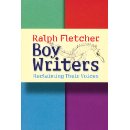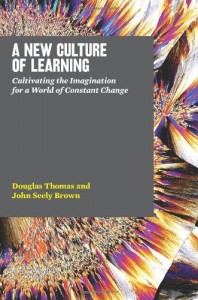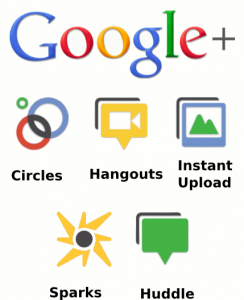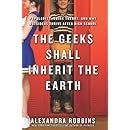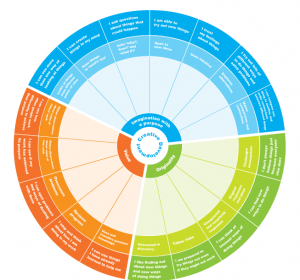July 1, 2011: Day 31
Book Smart or Smart Book #TedxPhiladelphiaEd : Matt MacInnis & Inkling
What I Learned:
- You can be book smart, but that does not mean you are “smart”…curious, innovative, take risks & question your learning
- Textbooks frustrate progress…they inhibit the teachable moment by saying, “now turn to page 132 in your textbook”
- Textbooks don’t have to be text or books
- Inkling is a new company changing the way educators look at books…exploring the future of textbooks
- explore content freely
- add notes and highlights
- create a learning network
- self assessment that will not only tell you if you are right or wrong, but why
- Right now there are 99 titles available geared towards higher ed
- The thinking behind inkling can be found here
My Learning Path:
- I attended #TedxPhiladelphiaEd on Saturday, June 25th
- Matt’s presentation was one that absolutely blew my mind
- Matt made me think about the possibilities beyond books, ebooks and readers, textbooks and netbooks…this is something entirely new
Further Learning:
- Follow inkling and stanine on twitter
- Learn more about inkling by watching the videos on the product page
- Download inkling through itunes to explore it more
- Begin to think about the possibility of ipads in the library or classroom…we are very google/pc based…is it worth the cost/product?
- Continue to explore textbook alternatives and open source outlets for learning
July 2, 2011: Day 32
Boy Writers: Reclaiming Their Voices Ralph Fletcher
Every teacher who teaches writing and has boys in his or her class needs to read this book. Fletcher discusses how to engage boys by allowing them to write freely…which means being flexible in allowing boy humor, war stories, comics, non-fiction, sports commentaries, etc. He writes, “As writing teachers, we cannot impose a one-size-fits-all writing process. Rather, we must help each student find a process that works for him or her.” Boy Writers: Reclaiming Their Voices has strategies that will not only engage boys, but will also encourage girls to take risks in their own writing. Fletcher’s strategies will remind writing teachers that boys approach writing differently, but good writing strategies are good writing strategies regardless of gender.
What I Learned:
- If we truly embraced the importance of failure in learning how to write we might respond differently-less critically-to their early drafts.
- A boy writer must be engaged. This is a nonnegotiable.
- Boys crave choice when they write.
- Give yourself permission to enjoy their humor. Boys really can be funny. Laugh!
- Humor gives them a crucial way to express their authentic voices.
- When it comes to producing legible sentences, the keyboard is the great equalizer. Letters and words always look the same, no matter who happens to type them.
- Most girls write for the teacher; boys write to entertain other boys.
- You find passion and humor in boys’ drawings. You find voice.
- As writing teachers, we cannot impose a one-size-fits-all writing process. Rather, we must help each student find a process that works for him or her.
- Create a classroom where he can reclaim his voice: the unique qualities of a writer’s personality that show up on the page.
My Learning Path:
- Recently, I’ve become very interested in the research about boys in the classroom
- I read The Trouble With Boys which prompted me to begin looking at how we teach boys in the classroom
- I had assigned Fletcher’s How to Write Your Life Story to my 8th graders for a summer reading book
- This prompted me to purchase Boy Writers
Further Learning:
- Share this book with teachers in grades 3-8 at my school
- Begin having conversations about how boys learn differently and how we can design lessons to support and engage them
- Read Misreading Masculinity by Newkirk
- Begin to follow the Guys Read blog
July 3, 2011: Day 33
A New Culture of Learning: Cultivating the Imagination for a World of Constant Change
Where imaginations play, learning happens… “What if, for example, questions were more important than answers? What if the key to learning were not the application of techniques but their invention? What if students were asking questions about things that really mattered to them?” ~Thomas This might be one of the most thought provoking books I’ve read about learning in awhile…and I read a lot! Thomas explains how play is the key to learning and the most essential skill of the 21st century. This book explores how we can cultivate imagination by designing environments that encourage questioning and innovation. Every educator should read this book to help students and themselves look at information collectively in order to absorb it and make it their own.
What I Learned:
- Play can be defined as the tension between the rules of the game and the freedom to act within those rules.
- Play, questioning, and—perhaps most important—imagination lie at the very heart of arc-of-life learning.
- The question is: In the twenty-first century, how do we cultivate the imagination?
- Our educational system has been built on the assumption that teaching is necessary for learning to occur.
- In the new culture of learning, the classroom as a model is replaced by learning environments in which digital media provide access to a rich source of information and play, and the processes that occur within those environments are integral to the results.
- A second difference is that the teaching-based approach focuses on teaching us about the world, while the new culture of learning focuses on learning through engagement within the world.
- The goal is for each of us to take the world in and make it part of ourselves.
- What students memorize are things they don’t actually use very often in their day-to-day lives.
- Learning that is driven by passion and play is poised to significantly alter and extend our ability to think, innovate, and discover in ways that have not previously been possible.
- Play provides the opportunity to leap, experiment, fail, and continue to play with different outcomes—in other words to riddle one’s way through a mystery.
My Learning Path:
- I originally read Jonathan Martin’s review here and added it to my “to read” pile immediately
- I shared the book with my admin and posted a review on goodreads
- Today Corey Sadlemyer @sidewaysschool was looking for book recommendations for his kindle, so I shared this book with him
- I used my kindle notes to reflect upon while writing this post today
Further Learning:
- Check out other books suggested by Jonathan Martin
- Consider ways to incorporate more play into my classroom
- Continue to encourage questioning and facilitate inquiry learning
- Read Reality is Broken
- Connect The Element and Out of our Minds to this learning
- Really work on ways that students can embrace and learn from failure
July 4, 2011: Day 34
Try Something New for 30 Days
What I Learned:
- Habits can be formed in 30 days
- Habits can be broken in 30 days
- Trying something new can lead to many different learning experiences
- Small, sustainable changes are more likely to stick
- The more challenging projects can lead to increased self confidence
- If you really want something badly enough, you can do anything for 30 days
My Learning Path
- I just happened to pop onto Ted and this talk jumped out at me
- I’ve been blogging my learning for the past 33 days and it has become habitual
Further Learning:
- Take the 30 days in November to participate in National Novel Writing Month
- Encourage my students to try something new for 30 days…and have them blog about it!
- Think of something new I want to dedicate myself to for 30 days after my summer of learning is over
July 5, 2011: Day 35
Learning to Love to Read in 30 Minutes a Day
Today I renewed my ASCD membership. I loved being a part of the #ascdsc11 twitter conversations over this past weekend, so I decided to hop over to the website and found this article on reading. Many of the ideas are not new to me, but I love the way the article was structured. What I Learned:
- Give students time to read (I really need to work on this)
- Help students choose just right books (I’d add find challenging books that are still appropriate for 8th grade)
- Promote reading fluency
- Teach comprehension strategies that help students develop thoughtful literacy
- Most students don’t know what to do if they aren’t understanding what they read…we need to work on metacognition
- Reading conferences are the answer to accountability in independent reading
- Teach students to question while they are reading to encourage critical thinking & metacognition
- Select novels with a strong theme for literature circles
- If you create a culture that promotes reading…you’ll create a community of readers
My Learning Path:
- In renewing my ASCD membership, this article was on the front page
- Steve Anderson @web2oclassroom posted a link to Daily Lit today, which had me thinking about reading in manageable chunks
- I’ve struggled with how to incorporate choices in independent books with accountability for some time…reading logs are not the answer…it is time to rethink this along with the addition of reading conferences
Further Learning:
- Design a reading workshop that works for my students
- Teach students about Daily Lit
- Add Nancie Atwell’s Reading Zone to my “to read” pile
- Find time for students to read every day in my class
July 6, 2011: Day 36
Cultivating Inventive Thinkers in the Middle Grades

This article was posted on the PLP (Powerful Learning Practice) site.
What I Learned:
- We need to break out of our own classroom “boxes”
- Middle School kids are painfully honest…I love that about them!
- In order to cultivate inventive thinking, you need authentic tasks
- Connected learning is not just thematic…it is making connections within the curriculum, outside the walls of the classroom, and in digital spaces
- Use rigorous questioning to promote collaborative learning
- The job of the teacher in these classrooms shifted from the main giver of knowledge to someone who coaches students toward solving an authentic problem while helping them connect content along the way
- Being flexible in an environment of constant change models innovative thinking for teachers and students
My Learning Path:
- I’m going to be participating in PLP’s Leading Edge Experience this year
- My school has had 3 groups of teachers go through PLP over the past 3 years and I’ve seen tremendous growth in thinking and technology
- I popped by the PLP website and saw the article in the Voices from the Learning Revolution section
Further Learning:
- Connect what I’ve learned here with the Day 33 post
- Read the entire action research project by Nagel Middle School
- Think about how we cultivate inventive thinkers at our school…begin to have that conversation with faculty
- Have faculty define what an inventive thinker is
- Gather project based work that showcases inventive thinking or have faculty to an inventive thinking smackdown at a meeting
July 7, 2011: Day 37
Can Wikipedia Improve Students’ Work?

“Rather than saying, ‘Don’t use [Wikipedia],’ I think it behooves us to teach them how to use it and how to make use of it and that they can contribute to an intellectual conversation even as fledgling junior scholars — they can contribute to that conversation too.”
What I Learned from this article:
- When students had the “pressure” of publishing in a public space, they were more focused on accuracy
- They were careful about citations and information being correct
- Technologies that are often dismissed because of their crowd-sourcing nature can actually be useful in the classroom
- More and more educators are warming up to the idea of Wikipedia as an educational resource
- The experiment gave her students a stronger appreciation for the research that goes into scholarly journals and encyclopedia entries and the care many average citizens put into upholding accuracy —a lesson she says others can apply in their classrooms
My Learning Path:
- After going through my Google reader today, I didn’t find anything that really caught my eye
- I clicked on my starred items and came across a few gems I had marked to read later
- I found this article about using Wikipedia
- I feel like there is a push down from high schools to not use Wikipedia, so I tend to tell my students to use it for their sources
Further Learning:
- Begin researching ways educators are successfully using and promoting Wikipedia as a valid educational resource
- Have a conversation with the middle school faculty about the use of Wikipedia
- The kids are using it any way…figure out how to teach them to evaluate entries and check for validity with other sources
July 8, 2011 Day 38
Google+
I’ve been muddling my way around Google+ this past week, so I thought I’d write about what I’ve learned for myself and from some articles I’ve read. An Introduction to Google+ Google+ The Pros and Cons Google+ and Education Google+ : Is this the social tool schools have been waiting for?
What I Learned:
- I really like the look and feel of Google+ …it allows for deeper conversations than twitter does, but also allows you to customize your stream, unlike facebook
- There are huge implications for schools, but Google is going to have to allow apps accounts to be able to participate
- I’m feeling a bit lost in a really big space and trying to make connections
- I’m also feeling a bit in limbo…I’m seeing the same posts on twitter and Google+, so I’m overwhelmed as to where to spend my time…since invites are open now, maybe that will change
- Google+ Twitter is a nice little feature that might just fix my limbo situation for now
- I’m glad I am flexible enough to explore new digital spaces…I’m excited about figuring out the possibility for Google+ for myself and my students
My Learning Path:
- I was thrilled to be invited…but it took a lot of refreshing to find an “opening” to actually sign in
- While waiting for my invite to activate, I spent a lot of time reading up on it in Google Reader as well as “listening” in on twitter conversations
- I’ve been playing around with it and will continue to explore the site myself and continue to read about the implications for school
Further Learning:
- Think about the implications for chats on twitter…could we make an #engchat huddle and begin chatting that way?
- Organize circles in a more purposeful way…right now I’m kind of duplicating lists and hashtags on twitter…but there has to be a better way
- Not everyone has their full name in their twitter profile, so I don’t have any way of adding them..is there a better way?
- If Google+ adds apps accounts, could this replace our faculty ning?
- Lots of questions…not a lot of answers, but I think most of us are in the same boat!
July 9, 2011: Day 39
Wiki Summarizer + More on Wikipedia
Wiki Summarizer allows you to search Wikipedia, have your articles summarized for you, and gives you a list of related articles…this might be the key to bridging the gap between those who use Wikipedia and those who forbid it!
What I Learned:
- Wiki Summarizer could be used as a way to start research with students
- Since it outlines key points and related articles, it forces the student to dig deeper to find and evaluate information
- The video included is a great overview of Wikipedia (will be great to share with faculty)
- The video helps to explain the validity and reliability of Wikipedia
My Learning Path:
- Just a few days ago, I posted about the value of using Wikipedia in the classroom
- Today, I came across Richard Byrne’s post about Wiki summarizer in my Google Reader
Further Learning:
- Use the common craft video to begin discussion within the humanities department
- Teach students to use Wiki Summarizer as their initial “go to” tool in the research process
- If I make Wikipedia accessible and give them the skills to use it correctly, they won’t feel like they are “sneaking” around to use Wikipedia
- Bring that conversation up to the technology committee and administration to find out where we stand on the use of Wikipedia
July 10, 2011: Day 40
The Whole Child
What will prepare each young person to work in careers that have not yet been invented; to think both critically and creatively; and to evaluate massive amounts of information, solve complex problems, and communicate well? Research, practice, and common sense confirm that a whole child approach to education will develop and prepare students for the challenges and opportunities of today and tomorrow.
What I Learned:
- Each student enters school healthy and learns about and practices a healthy lifestyle.
- Each student learns in an intellectually challenging environment that is physically and emotionallysafe for students and adults.
- Each student is actively engaged in learning and is connected to the school and broader community.
- Each student has access to personalized learning and is supported by qualified, caring adults.
- Each graduate is challenged academically and prepared for success in college or further study and for employment in a global environment.
- These tenets seem like common sense, but they are an amazing guide for educators and administrators.
My Learning Path:
- I was spending some time surfing the ASCD website and came across the Whole Child section.
- I was immediately drawn to it because my school focusing on teaching in mind, body, and character
- I had wished that I knew about this section of the site when I was doing my principal internship…it would have been helpful in crafting my philosophy of leadership and entry plan
Further Learning:
- Share this with faculty and administration
- Are we staying true to teaching the whole child in mind, body, and character?
- What can we do to ensure our school environment reflects teaching the whole child?
July 11, 2011: Day 41
So What Do You Call a Textbook that Isn’t a Book?
Check out this article by David Warlick
What I Learned:
- Digital curriculum is a teacher produced, designed, and maintained assembly of resources and tools
- What about new teachers? They often cling to their textbooks like rafts
- Maybe part of new teacher training involves preparing them for the next 5 years and helping them to construct their first digital curriculum
- A teacher carrying a self made digital curriculum is a powerful thing
My Learning Path:
- I came across this in my Google reader and posted it on my Google + stream with a few thoughts
- Jennifer Barnett added some great thoughts to it. I especially liked this one: New support systems need to be in place to truly mentor novice teachers – for these reasons and many others!
Further Learning:
- I mentioned to Jennifer that I would talk to Lisa Dabbs and Joan Young about exploring this topic in #ntchat (new teacher chat)
- I think as a community, we need to have these conversations with the higher ed people we know and administration…the admin need to know how these are made and why they are vital to a teacher just starting off to a veteran teacher
- Think about using Livebinders as a tool in which to execute this and made a sample digital curriculum
July 12, 2011: Day 42
The Geeks Shall Inherit the Earth
Popularity, Quirk Theory, and Why Outsiders Thrive After High School
by Alexandra Robbins
What I Learned:
- I haven’t even finished the book and feel compelled to write about it already!
- QUIRK THEORY: Many of the differences that cause a student to be excluded in school are the same traits or real-world skills that others will value, love, respect, or find compelling about that person in adulthood and outside of the school setting.
- All of this points to the reason that student bullying is up, self-esteem is down, and social warfare is fierce
- Quirk theory is intended to validate students’ inability or refusal to follow the crowd. It serves as a way to explain that, once they leave the school setting, their lives can improve.
- Studies have shown that, at least among students, popularity equates with visibility.
- Perceived popularity refers to how students rank a classmate’s reputation rather than their personal opinion about her.
- To be popular does not mean to be liked.
- Relational aggression, also known as relational bullying, covers ignoring, spreading rumors, shunning, eye rolling, glaring, snickering, and sneering. It is intended to harm by damaging or manipulating others’ self-esteem, social status, or friendships.
- relational aggression can be difficult to punish because the meanness is indirect or the identity of the perpetrator isn’t obvious
- Meanness is a language that allows a girl to enjoy her popularity, protect her status, wield her influence, display her seemingly invincible power, and force peers to recognize her dominance.
- Creativity. Freethinking. Resilience. Authenticity. Candor. Courage. None of these characteristics typically marks the collective popular crowd in schools.
My Learning Path:
- I had seen this come through my Goodreads stream and immediately downloaded it to my kindle
- I have to say one of my favorite features about kindle is my ability to access my notes and highlights from a computer
- I have only read 1/3 of this and have had so many good conversations and thoughts rolling around in my head about it so far
Further Learning:
- Finish the book
- Continue to post about what I learned from it
- Share this book with admin…recommend it to all middle school and high school teachers
- Connect this learning with the bullying program we are trying to piece together for my school
July 13, 2011: Day 43
New Teachers Have it Made! ….because of two inspiring educators…
Lisa Dabbs and Joan Young have been at the forefront of mentoring new teachers for the 21st Century. They created #ntchat (new teacher chat) on Twitter last year which has grown into a dynamic space for new teachers to learn from each other and mentors within the twitter community. Lisa asked me to collaborate her on week two of new teacher boot camp on edutopia. Here is the interview and article about voicethread we created.
What I Learned:
- There are many seasoned teachers and administrators who are dedicated to supporting new teachers
- Edutopia is supporting online professional development with an amazing blog series here Check it out..you might just learn something new!
- Voicethread can be used across every content area and grade level..it is dynamic and easy to use
- By following #ntchat, I got some great ideas that I hadn’t thought of for using voicethread
- I only wish I had this kind of support and digital resources available 16 years ago when I was first starting out!
My Learning Path:
- Check out my amazing connection with Lisa Dabbs here
- Lisa asked me a couple of weeks ago if I used Voicethread in the classroom and if I’d be willing to be a guest blogger on her edutopia blog
- Lisa and I did a wetoku interview for the article
- I sat in my hotel room at the Venetian in Vegas and participated in #ntchat…too cool!
Further Learning:
- Make it a point to participate in #ntchat throughout the year
- Talk to Lisa about mentoring new teachers…I think she has a virtual mentorship program
- Share #ntchat with my principalship cohort…several are being hired as new principals as we speak!
- Be thankful for the connections that I make…they have lead to some really cool experiences in my life. Thanks Lisa!
July 14, 2011: Day 34
Livescribe Rocks for Conferences!
I’m at the National Singapore Math Conference in Vegas and have been using my Echo Livescribe Smartpen to take notes during sessions.
What I Learned:
- I have been able to digitally take notes without having to lug a digital device around with me
- For math…especially bar modeling, I’ve been able to record the process and the audio in order to play it back for teachers at my school
- I can easily upload my notes to Google Docs to share with teachers who could not attend the conference
- My pencasts will become professional development references as we begin to implement Singapore Math in our school
- I wish I had this when I was in grad school!!
My Learning Path:
- I attended TedxPhiladelphiaEd last month and received a Livescribe Echo Smartpen in my swag bag!
- I didn’t even open it until I got to this conference
- I decided to guinea pig it the first day of the conference…and I never turned back to any digital device!
Further Learning:
- Think about the implications for the classroom
- I could have students take turns making pencasts of class discussions and instructions, which I could then share in Google Docs. This would be great for those who were absent or needed to reflect back to the lesson.
- Consider getting a few as a professional development purchase for teachers to sign out and “play” with
- Use the pen to take notes during meetings this year and upload them to Google Docs…when in conversation, it is less obtrusive than typing while trying to have a conversation
July 15, 2011: Day 45 (1/2 way there!)
Singapore Math
I’ve been at the National Singapore Math Conference this week. I couldn’t possibly begin to explain all the amazing things I’ve learned, but wanted to jot down a little since I’ve mentioned several times that I’m here. Dr. Yaep Ban Har is the world’s leading expert on Singapore Math. Here he is giving anoverview of why Singapore Leads the World in Early Mathematics:
What I Learned: (a list of sessions I attended)
- Math Talk and Early Math Vocabulary Development
- Laying the Groundwork for Early Numeracy
- Getting Number Bonds to Bond
- Implementing Singapore Math Through Embedded Professional Development
- Adopting Singapore Math: Promises and Pitfalls
- Teaching Subtraction With Ease
- Using Assessments to Guide Your Math Instruction
- Powerful Strategies for Using Technology to Differentiate Math Instruction
- Becoming a Truly Effective Math Coach
- Maintaining Implementation: Changing Thinking & Expectations
- Mental Math Mastery
- Solving Challenging Word Problems With Model Drawing
- Getting Change Resistant Teachers on Board
- Winning Parents Over to Singapore Math
- Classroom Modeling (live class with students)
My Learning Path:
- In my new position, I am helping guide the rolling adoption of the Singapore Math program in preK-2 this year and 3-5 the following year
- The math department chair and I began researching Singapore Math last winter
- We began our implementation and professional development plan
- We’re in Vegas learning everything we can about Singapore Math, which we will bring back to our teachers
Further Learning:
- Check out the websites I learned about this week:
- Check out the books that I learned about this week:
July 16, 2011: Day 46
Ideas for Being a Life Long Learner in the 21st Century
I had an interesting coincidence while sitting in the airport today. Jim Eagan posted the above tweet to me and then I came across this article by Lisa Nielsen within moments of reading it.
What I Learned:
- Below is Penelope Trunk’s advice for those adults who want to be lifelong learners.
1. When it comes to learning, keep your bar very high. 2. Walk a narrow path so you can keep learning to jump off the path. 3. Learn by way of discovering what you care about, and not the other way around. 4. Cater to your learning style. 5. Accept that lifelong learning is a huge time investment. 6. Spend as much time unlearning as you do learning.
- Although my summer of learning was meant to be a personal attempt at metacognition, I appreciate those people who have found interest in it as well as supporters like Jim Eagen.
- 1. When it comes to learning, keep your bar very high. 2. Walk a narrow path so you can keep learning to jump off the path. 3. Learn by way of discovering what you care about, and not the other way around. 4. Cater to your learning style. 5. Accept that lifelong learning is a huge time investment. 6. Spend as much time unlearning as you do learning.
My Learning Path:
- After a week of intense learning at the Signapore Math conference along with Jim’s tweet and Lisa’s article, I realized that my habitual learning is significant to being a life-long 21st century learner and educator.
- When I read Penelope’s advice, I was amazed at how closely I’ve been following her recommendations. I especially think the unlearning comment relates well to this week as I unlearned everything I ever learned or thought about teaching math…and I’m not even a math teacher!
Further Learning:
- Share Penelope’s advice with others to help promote ways to be engaged as a life-long learner
- Continue to find ways to challenge my thinking and learning
- Don’t just stay within the twitter echo chamber…investigate and listen to those who are not “in the choir”
- Choose something new to learn each day and instill that love for learning in my children and my students
July 17, 2011: Day 47
You are What you Tweet
What I Learned:
- Infographics are a cool way to share info!
- I’m a rapper? LOL
- I have one follow for every follower…I like that equity
- My favorite part are the topics…if I would have listed them myself, those would be the words I would have chosen!
- Some strong connections are missing, but most are on point
- It really is amazing what a program can do with data
My Learning Path:
- I was cruising Google Reader and came across @dougpete ‘s post on visual.ly/twitter
- Doug was one of my first connections on twitter and he still continues to be a constant source of information and support
- I decided to go ahead and make my own!
Further Learning:
- This would take a lot of work, but I keep thinking how cool it would be to create twitter accounts and have students tweet as them…they could have face offs!
- Check out the implications for learning on visual.ly
- Discover ways to have students create infographics in class…revisit Kathy Schrock learning post
July 18, 2011: Day 48
Finding Our True Center
The center of a classroom is not a test, a textbook, or the posters on the wall. It’s not a state or district policy, and it most certainly is not a federal law. The heart of the classroom is found in the unique relationships between students and teachers. A surprising blog post from the US Department of Education
What I Learned:
- I read this article before I knew where it came from
- I found myself smiling and agreeing as I read along
- These are some of the quotes that jumped out at me:
- Programs don’t change people, relationships do.
- classrooms be filled with great teachers who have high expectations, content knowledge, sound pedagogy and the ability to connect with and motivate students
- A teacher full of fervor, who is able to inspire and connect with her students and build a community of learners, forms this center
- Government cannot create these relationships
- Teachers need leaders who will provide them with authentic evaluations based on multiple measures
- supported by meaningful professional learning opportunities that help them to grow and engage collaboratively to address their unique challenges
- Teachers need avenues to connect with families and community partners. And they need us to respect them as professionals, pay them fairly for a job well done, and offer leadership paths that do not always force them to leave the classroom
- We must treat our teachers well
- Sounds pretty good, right? So here are a few of my thoughts…
- Where is the disconnect between government and local public schools
- Why don’t public school teachers feel that they are the center as this blog post suggests
- Do our teachers feel treated well, and supported with fair pay?
- I could go through each quote above…but I won’t. I was a public school teacher for 7 years and have been in an Independent School ever since, so I do see this through a different lens. What I do see are teachers in my son’s school working tirelessly, friends feeling frustrated by testing, testing, and more testing in their classrooms, as well as the constant fear of losing their jobs.
My Learning Path:
- I found this in my Committed Sardine blog update
- I thought it was a lovely little post until I saw where it was originally posted…
Further Learning:
- Send this to my cohort classmates in my principal program…they need to *see* this
- Remember to support my public school teacher friends when they are feeling suffocated by mandates
- Be thankful my son’s public school goes above and beyond to make teachers the center of their classroom
July 19, 2011: Day 49
Google’s 20% In The Classroom
This post caught my interest on Google + today regarding using Google’s 20% policy in the classroom.
What I Learned:
- There are several schools already using Google’s 20% where they either give them 20% of the time in a day or a week to explore learning in a more independent, innovative manner
- Interesting that Brian Mannix cites “getting through” the curriculum as a roadblock (curriculum needs to be more fluid and flexible to allow for authentic learning experiences)
- 20% time can be individual or collaborative teams
- This time by those using it is referred to as “sacred”…it has to be if it is going to work
- 20% time allows for learning exploration and teacher facilitation
My Learning Path:
- I was checking my Google+ stream and caught Mark Wagner sharing Brian Mannix’s post and discussion
- It immediately sparked an interest in me…20% is so successful for Google…why shouldn’t it be successful for students?
Further Learning:
- Check out Oliver Quinlan’s post about 20% time
- How could I use this in the classroom? …I’m thinking there could be some really great literacy projects in here
- Is this something we could use as an elective?…possibly a learn what you want type of class?
- Refer back to some of the independent learning sites I have in diigo
- Consider how I can use 20% in my position (LOL like I don’t do this on my own free will!)
July 20, 2011: Day 50
Stratalogica
Today we got the state funding to implement Stratalogica in grades 2-8 for the next 5 years!!!!
What I Learned:
- Stratalogica integrates beautifully with Google Earth
- It offers hands on, collaborative spaces to really learn about geography
- Not only are there amazing interactive digital maps, but beautiful atlases for kids to get their hands on
- This is a great way to use our SmartBoard technology in all of our classrooms
- Stratalogica makes it easy to teach current events on a daily basis
- There are rich historical digital atlases that can be used while discussing historical events
- Students can add pins, text, video, etc to create rich, authentic projects
My Learning Path:
- I saw @NMHS_principal tweet about Stratalogica last spring
- I had a rep come in and give a demo…which blew away the humanities department
- We just got the funding today to implement!
Further Learning:
- Begin looking at ways teachers are using Stratalogica in the classroom
- Browse their forums to get ideas
- Plan an inservice for teachers who will be using it
- Continue to find ways as to how to connect to current events
July 21, 2011: Day 51
Validate Someone Today! (…and smile)
What I Learned:
- Spend the next 16 minutes watching it for yourself…you’ll be glad you did!
My Learning Path:
- I came across this in my Google Reader via Vicki Davis…who has a great story about how it “circled” to her
Further Learning:
- Remember to “validate” students every day
- Remember to “validate” my colleagues every day
- Remember to “validate” my family every day
- Smile 🙂
July 22, 2011: Day 52
Identify Your Writing Strengths: Step 1
I stumbled across this post by Miriam Forster on her writing blog.
What I Learned:
- Make a list of all things you love to see in books
- What you love, you also understand
- What you understand, you will be able to do well
- A book you love is one you get lost in and that can be read over and over…they are “comfort reads”
- To identify your writing strengths, first identify the books you love
My Learning Path:
- I found this earlier today…but I don’t remember where! It’s 104 degrees here and my short term memory is fading from it!!
Further Learning:
- Subscribe to Miriam’s blog
- Create my own list and share it with my students
- Think about ways I can use this in the classroom…surely if I get kids to list what they love in books, it will help their writing!
- When choosing books to use in class…think about the ones they will remember and get lost in.
- Remember that authors promote reading in order to be a better writer…it is an important lesson for students and teachers!
July 23, 2011: Day 53
Generation Z: Their Learning Will Never End
Read here about what Superintendent Michael Smith has to say about Generation Z.
What I Learned: (some of my favorite quotes from the post)
- This means the new world has been around for roughly a decade
- Our children have moved on without us
- Kids today no longer want to play by our rules
- They don’t understand why schools are locked up at 3:30 and on weekends.
- They don’t understand why computer labs contain equipment that is inadequate compared to what they use at home (and in the car).
- But they do understand learning doesn’t begin and end for them at school.
- They don’t need us. The don’t need brick buildings that are only open 7 hours a day.
- They’re going to learn with or without our help.
- And the learning process is not going to stop for them after 8th grade. Or high school. Or even college.
- The future isn’t coming, it’s already arrived.
My Learning Path:
- I’ve been following Michael’s blog and twitter feed ever since I started my Principal Certification process in 2009
- Michael is a generous learner who isn’t afraid to tell it like it is…which I admire
- When I saw Michael’s post about Generation Z, it stopped me in my tracks…it is everything I’ve been mulling around in my head about this generation for awhile now
Further Learning:
- Continue to promote the usage of digital devices not only in my classroom, but within the school…let teachers know that when used purposefully in the classroom, digital devices enhance learning
- Reflect back on the 20% post from the other day…this could be key in incorporating independent learning into the traditional school model
- Continue to follow Michael to remind myself their are some trailblazers out there in the administrative part of education
- Think about how Generation Z learns and experiences the world differently…identify it…and bring it into the classroom
- Jeff is one prepared new principal! His thoughtful presentation and leadership style sets the tone for his faculty and students to be engaged in learning and teaching from day one.
- Mantras can be much more effective than missions…great video by Guy Kawasaki.
- Modeling 21st century skills and tools in presentation is vital to being an effective leader
- Having a collaborative vision for the school creates a community where all feel their voices are heard
- Jeff’s faculty and students are lucky to have him!
- Greta Sandler re-tweeted Jeff’s blog post on twitter
- I re-tweeted it and sent it to a colleague as well as a friend who is a new principal
- I reflected on the past two years in my principalship program…I wish that these types of resources were shared with my cohort
- Subscribe to Jeff’s blog and follow his endeavors in his first year of the principalship
- Share the post with my principalship cohort
- Consider creating a mantra with my 8th grade class
- Keep in mind Jeff’s 3 questions when designing and implementing curriculum:
- What is the purpose?
- Is it a good use of time and resources?
- Is it in the best interest of students?
- PLNs are *personal* they vary from person to person
- They are not just online…they are face to face interactions
- PLNs can be built through twitter, blogging, Google +
- The best PLNs are a combination of mediums
- It really is all about the conversation…wherever it comes from and however you express it
- It isn’t necessary to use all mediums (social media, communities, blogging, multimedia, in-person, print, professional development)
- View your PLN as a professional development resource
- I follow John’s blog on my Google Reader
- I recently had a great conversation with one of my principalship cohorts based on online PLNs…I sent him this post today!
- Create a professional growth plan with my strengths, weaknesses, and specific goals for growth
- Add people to my PLN who challenge my thinking
- Work on my PLN within Google+… focus on specific circles…organize them for optimal learning!
It turns out passion is not as elusive as we think. Just like daily exercise leads to a more fit and healthy body, there are habits that lead to fire in your belly. If we are to cultivate such a lifestyle we must act accordingly.
- Surround yourself with passionate people
- Create space…passion thrives in emptiness
- Help someone in a way only you can
- Keep a journal of what inspires and excites you
- Challenge the norm
- Scare yourself- live outside your comfort zone
- Find the right reasons
- Learn something new
- Start a blog (constantly fuel something that interests you)
- Your life is an experiment…it’s up to you to learn from it
- I follow Zen Habits in my Google Reader
- I initially added it to my reader because it was something a little out of my norm for reading…gave me a break from edu-posts
- Since finishing my M.Ed. and principal certification this past year, I need to find another outlet for learning…it was my passion for so long, so now it is time to make plans for what I’ll focus on next
- Think of a way to make this list in a way that my students could relate…their lives should be ignited by passions as well
- Continue to find blogs to add to my reader that help me think differently
- There are many books we read that transform the way we see the world
- Convincing someone to read one of them is a great thing
- I have not read any of the books on Gretchen’s list
- Gretchen pushes herself to read a variety of subjects
- Creating a list of books and why you chose them is a valuable exercise
- I read Gretchen’s Happiness Project last year and added her blog to my reader
- Create my list of 7 books (blog about it, share it with my students)
- Ask faculty members to create a list..you can learn a lot about a person from what they read!
- Really think about the fact that books can be transformative…keep that in mind when choosing novels for students
- This might be one of the best ted talks I’ve seen
- We put constraints on our students with due dates and trimester endings…but sometimes authentic learning doesn’t fit in that space
- Give students time to go through the process of learning…if they fail, give them more time to learn from it
- The structure of traditional schooling needs to look differently in order to have time to really learn…not just prep for tests
- Teachers need to be willing to learn along with students
- You shouldn’t “get through” a curriculum
- I had seen this posted on twitter awhile back and I just got around to really watching it
- I had a student do a project on Nicola Tesla and he made a tesla coil that failed…he still hasn’t finished it. Watching Shawn’s student reminded me of that disappointment
- Many of the students Shawn describes I’ve had in my classroom and had to really work to help them “get through” whatever we were doing…I began just giving alternative assignments where they had choice.
- Subscribe to Shawn’s blog
- Continue to give students opportunities to follow their passions and give them room to fail and learn from it
- I saw someone on twitter refer to FAIL as (first attempt in learning) keep that in mind
- Think about ways that the schedule of the school day (or my class) could be designed to have more open learning opportunities
July 29,2011: Day 59
Math Pickle
The above video is the unsolvable 2nd grade problem at mathpickle.com
What I Learned:
- Math Pickle is a dynamic site that offers math problems in several formats
- Teachers watch the video to prepare for the problem
- They download the ppt or keynote along with handouts and put their students in a “pickle”
- These problems offer opportunities to work collaboratively in math
- Gordon has developed problems for grades K-12 and also offers a reviews page
- I watched the wiggle worm and 2nd grade unsolvable problem and was hooked!
- I was attending the Reform Symposium yesterday #rscon3 and had a column open on tweetdeck
- I noticed while I was in another session that a lot of people were referring to David Wees session and linking to math pickle
- I bookmarked it to review later
- Watch David’s archived #rscon3 session
- Send this site to the math department
- Think about ways we can get teachers excited about math problems…maybe a math pickle day of the month?
- Make connections to what I just learned about math problem solving in my Singapore Math training
- Spend time on the math pickle site going through the problems and trying them out myself…they would make a great faculty meeting opener!
July 30, 2011: Day 60
How Do We Measure Creativity?
The creativity wheel can be viewed in detail here.
What I Learned:
- Creativity can be measured
- You need to decide whose creativity is more important…yours or your students
- Imagination with purpose means there is an imaginative activity directed at achieving an objective
- Originality refers to teachers creating questions and problems that are relatively new to students…this creates original work by students
- Creativity is valuable when related to its purpose
- I was attending Pam Burnard’s #rscon3 session this morning entitled: Creativity and creative learning: Redefining the future of learning
- In her session, she mentioned showed the creativity wheel, so I looked it up
- Consider ways to include using the creativity wheel in my classroom
- Investigate the Creative Partnerships site
- Begin conversations at school about measuring creativity and innovation
July 31, 2011: Day 61
Everything is a Remix Part 3 from Kirby Ferguson on Vimeo.
What I Learned:
- Kirby Ferguson has been documenting the history and cultural significance of collaborative creation
- The transformation from Xerox to Apple was fascinating
- The basic elements of creativity are: copy, transform, combine
- I was amazed that someone retyped The Great Gatsby to get the feel of writing a great novel
- Everything really is a remix
- When writing my previous post, I saw @brainpicker tweet this blog post
- Since I was already in the “creativity” zone, I clicked it and watched the video
- Go back and watch Kirby’s other two installments of Everything is a Remix
- How does this apply to my classroom? How are students remixing material without plagiarizing?
- How can we celebrate remixing but acknowledge the legal and ethical aspects of remixing?
- Watch the final installment this fall


